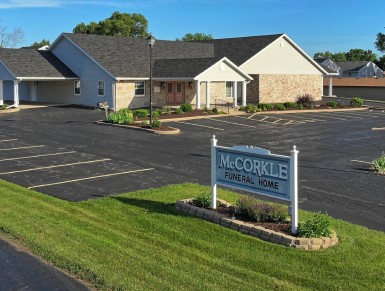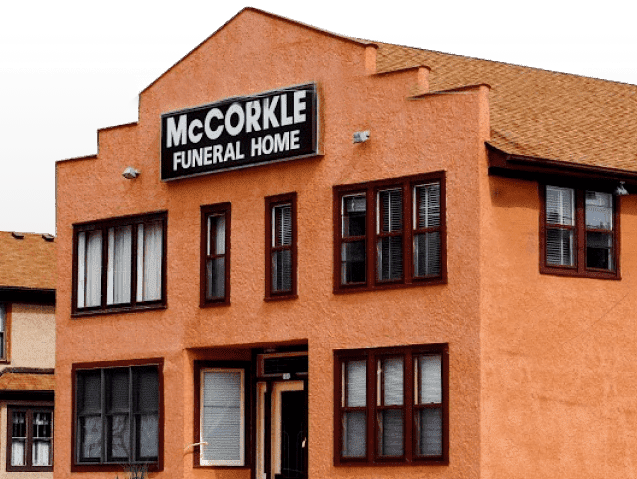COMMON QUESTIONS
At McCorkle Funeral Home, we're here to support you every step of the way. Our team is always available to answer questions and provide guidance during a difficult time. Below, you'll find answers to frequently asked questions on funeral arrangements, Social Security benefits, and more. If you don't find what you're looking for, please don't hesitate to reach out.
What is a funeral and why should we have one?
A funeral is a ceremony held after someone passes away that brings family and loved ones together for an opportunity to express their love, respect, and share grief. Funerals can help support the healing process by providing an opportunity for people to share their feelings and thoughts about death and remember the person who has died. Funerals are not required, but they can be a very helpful occasion for those who are grieving as they work toward healing.
What Type of Service Should I Have?
There are numerous choices for what type of service you choose and how you wish to celebrate your loved one. Generally a family will make a decision for the service, unless there is a pre-planned funeral arrangement in place. Religious or cultural customs may also determine the style of service to be held. You can choose from a traditional service, decide whether you want to hold a viewing, hold a memorial service where the decedent is not present, or any type of service you wish. You may also choose to have a traditional funeral service even in situations where the deceased is cremated. We can help you explore your options and choose the best type of service to fit your loved one's wishes.
What does a funeral director do?
A funeral director takes care of all aspects of funerals and related services, both in a caregiving capacity and as an administrator. They are licensed professionals who provide a wide variety of services, many taking place behind the scenes so that the family does not have to worry about them. The funeral director is responsible for coordinating the removal and transportation of the decedent, completing all necessary paperwork, and implementing the choices made regarding the funeral and final disposition of the body. They also play an important role in guiding, supporting, and helping the family during their time of grief, whether with completion of tasks or with grief counseling, answering questions, etc.
Why are funerals so expensive?
Funerals are a major life event, similar to a wedding or birth of a child. Just like those events, funeral costs can vary widely depending on the budget, taste, and preferences of the family. The expenses of running a funeral home must also be factored into the cost breakdown, including 24 hour availability, and all of the amenities that come along with operating the facility (viewing rooms, chapels, limousines, hearses, etc.) The services of the funeral director in handling the administrative details such as paperwork, coordinating any services and preparation of remains also need to be considered in the total cost. Funeral merchandise is one area where prices can vary, and we can work with you to help choose selections that best suit your wishes while staying within your prefered budget.
What Is The Purpose of Embalming?
Embalming sanitizes and preserves the body using chemicals to help extend the time between death and final disposition so that a viewing may be held. The process can help create more time for the family to arrange services and coordinate funeral details, if necessary.
Is embalming required?
No, except in certain circumstances where time, health or legal requirements might make embalming necessary, it is generally not mandatory. There are situations where embalming may be required if the decedent is being transported by air or to another country where it is required. We will always advise you if embalming is required, and tell you the reason it is required.
Should I choose cremation or burial?
Burial in a casket is the most traditional and common method of disposition. Most people envision a funeral with a casket present or a graveside service when they think of a funeral. However, cremation is becoming more popular because it tends to be less expensive and provides more flexibility when planning a memorial service since it allows more time for plans to be made and family to come together. You can also choose to have a traditional funeral with a casket followed by a cremation, if that better suits your preferences. We can help you understand all the options and choose what is best for your loved one
What are my options for cremated remains?
There are numerous options available for how you decide to handle cremated remains of a loved one. We typically think of a family member keeping the cremains in an urn, but there are several other choices. Some people choose to bury cremated remains in a cemetery plot as you would do with casketed remains. There are also cremation niches in columbariums available at some cemeteries, similar to a mausoleum for a casket. You may choose to scatter the ashes at a place that was significant to the decedent and holds special meaning for them. Most cemeteries also have scattering gardens where you can spread the ashes. There are also several types of memorial jewelry and keepsake urns that contain a small portion of the ashes so that several family members may keep a memory of the person who has passed away. Cremation offers a wide range of flexibility in final disposition choices, and provides extra time for you to make the choice that is right for your loved one.
Is there financial help available if I need help paying for a funeral?
There are several resources that may be available to you, and we are happy to help you explore the options. Many people are eligible for financial assistance through the Social Security Administration, Department of Veterans Affairs, or state funeral funds. The decedent may also be entitled to funeral benefits under a life insurance policy. Several non-profits, charitable organizations, and churches have options for paying funeral expenses. We also offer lower cost services such as a direct cremation or direct burial, which can be wonderful choices if you are trying to be conscious of a budget when making plans.



